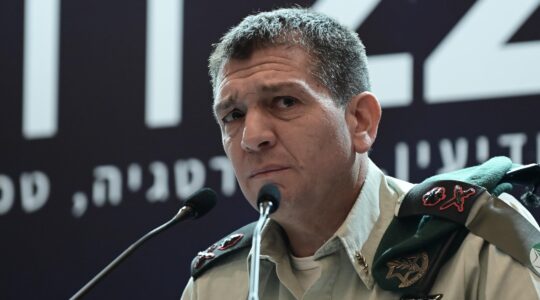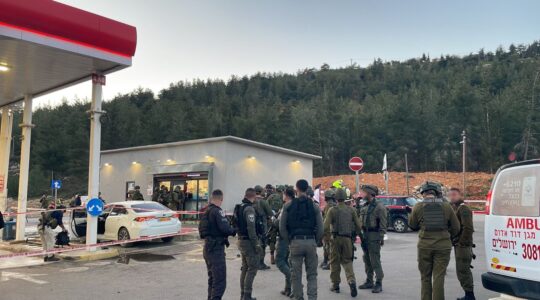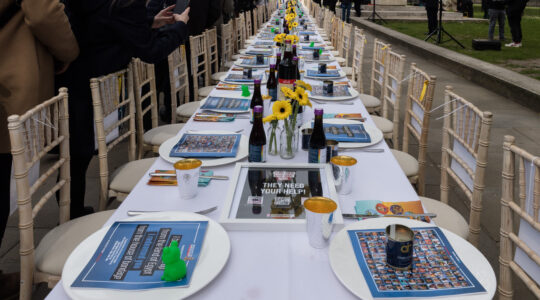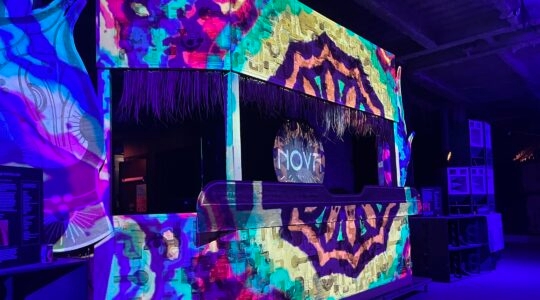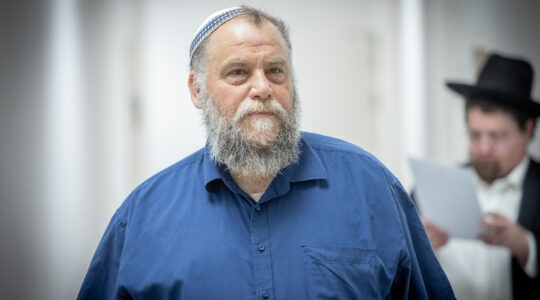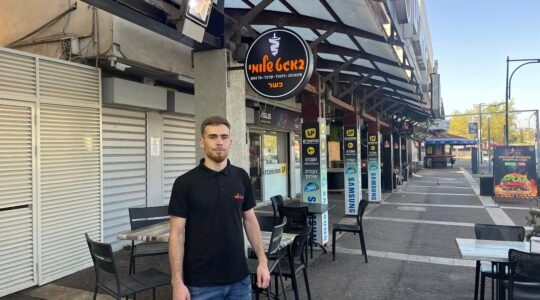
Several Jewish organizations have condemned last week’s outbreak of Israeli settler violence, which included the defacement of Palestinian graves with the Star of David. (Brian Hendler)
NEW YORK (JTA) — Until late last week, the rising threat of violence by Jewish settlers in Israel was greeted with silence by American Jewish groups.
But the outbreak of violence Dec. 3 at Beit Hashalom, a disputed property occupied by Jews in the heavily Palestinian city of Hebron, prompted a flurry of statements, the bulk of them condemning settlers who forcibly opposed the security forces sent to evacuate them.
Statements from the American Jewish Committee, the Anti-Defamation League, the American Jewish Congress, and the dovish groups Ameinu and J Street criticized the settler reaction, which included setting fire to olive trees, stoning vehicles and pedestrians, and defacing Muslim graves with the Star of David. Israeli Prime Minister Ehud Olmert termed the violence a “pogrom.”
On Tuesday the Zionist Organization of America, which had established a Hebron office in the disputed building, told JTA that it also would be issuing a statement condemning any Jewish violence. But the ZOA’s president, Morton Klein, told JTA that his organization rejects the Israeli government decision out of hand, takes vigorous issue with Olmert’s characterization of the violence and sees the violence as the reaction of a “handful” of young people.
Two Orthodox organizations that frequently speak out on Israel-related issues — the Orthodox Union and the National Council of Young Israel — chose not to issue statements condemning the violence against Israeli soldiers and nearby Arabs.
The O.U. did not issue a statement regarding the events in Hebron. The National Council of Young Israel did speak out, but it ignored the settler violence against Palestinians, instead blaming the Israeli government for the clashes between settlers and the security forces.
“It is terribly ironic that the Israeli government found a way to transform Beit Hashalom — the House of Peace — into a house of confrontation and conflict,” the National Council of Young Israel said in a statement. “We strongly condemn the actions carried out by the Israeli government against the citizens of Hebron and urge our Israeli leaders to protect the Jews of Hebron, not persecute them.”
Young Israel, which did not respond to several requests for comment, also criticized Robert Serry, a United Nations envoy, after he issued a statement very much in line with the other Jewish organizations.
“I condemn the ensuing violence and attacks by Israeli settlers against Palestinian civilians and the destruction and desecration of Palestinian property,” said Serry, the U.N. special coordinator for the Middle East peace process.
Most American Jewish groups echoed those sentiments, with the Anti-Defamation League offering the most robust denunciation of the settlers who took part in the violence.
“The attacks against Palestinians, their farms, cemeteries and other Muslim property by Jewish extremists are deeply troubling and unacceptable,” the ADL said. “These attacks and those against Israeli soldiers and police, who were there to enforce a Supreme Court order to evacuate a contested building, are a direct assault on the rule of law and only serve to undermine Israel’s democratic institutions.
“We are also disturbed at reports that some of the Jewish extremists wrapped themselves in the imagery of the Holocaust by sewing yellow Stars of David into their clothing and shouting ‘Nazi’ at Israeli soldiers.”
Reports of Jewish assaults on Hebron Arabs and their property are the latest in the a series of incidents that have prompted growing concern, both in Jerusalem and Washington, that right-wing agitation is threatening to spiral out of control.
In September, a prominent left-wing academic, Ze’ev Sternhell, was injured by a pipe bomb that authorities believe Jewish extremists planted outside his Jerusalem home. Last week, Israeli police arrested two teenagers they believe participated in the ideologically motivated stabbing of an Israeli Arab near the fervently Orthodox Mea Shearim neighborhood of Jerusalem.
On Dec. 4, the e-mail newsletter of the dovish Middle East Progress included links to a number of recent articles drawing attention to the danger posed by rising extremist sentiment among Israeli Jews.
One of them, by Matthew Levitt and Becca Wasser of the Washington Institute for Near East Policy, noted that while settler violence pales in both quantity and lethality to Palestinian terrorism directed at Jews, nevertheless there has been a “substantial increase” in the number of such incidents. It also reported on growing concern over the settlers’ so-called “price tag” strategy, an initiative of mostly younger settlers who have vowed to hit back hard against any attempt to challenge settlement expansion in the West Bank.
Prior to the evacuation, the ZOA publicly touted its presence in Beit Hashalom. It also sent around an e-mail from another organization urging that all Israeli political and military officials be barred from synagogues if settlers were removed from the house.
Nevertheless, its leader this week condemned the violence and the price tag strategy. Klein said that while he opposed the move to evacuate the premises, the government’s lawful decisions should nevertheless be respected.
He also said that the e-mail did not reflect the ZOA’s position and was sent out in error. Finally, Klein noted that Israel’s Supreme Court permitted, but did not mandate, the evacuation of the house. Statements from the ADL and the AJCommittee both portrayed the evacuation as required by the court.
“We are very upset that the government decided to proceed when not required to and that they did not work out a peaceful resolution, which my contacts in Hebron felt they were on the verge of doing,” Klein told JTA. “They were shocked by this.”
Klein added that Olmert’s description of the violence as a pogrom was without justification and that he owed the Jewish people an apology.
The president of the Orthodox Union, Steven Savitsky, in an interview with JTA would not specify the reasons for his group’s silence about the anti-Arab violence. The group in the past has drawn attention to the plight of evacuated Jewish settlers.
Sources within the Orthodox Union, which encompasses a broader spectrum of political opinion than the National Council, hinted that its membership in Israel pressed to denounce the government action.
Savitsky told JTA that the O.U. position was more or less the same as that of the ZOA: The government should not have evacuated the house, the ensuing violence was without justification and the Olmert comment was “ridiculous.”
Asked why the Orthodox Union had not spoken out on the subject of Jewish violence against government forces and Palestinians as it did during its Jerusalem convention last month on the future status of the Israeli capital, Savitsky said, “There are a lot of circumstances here. It’s a complicated situation. It’s not black and white. It’s not cut and dry.”
“Jerusalem,” he said, “is as simple as anything.”
